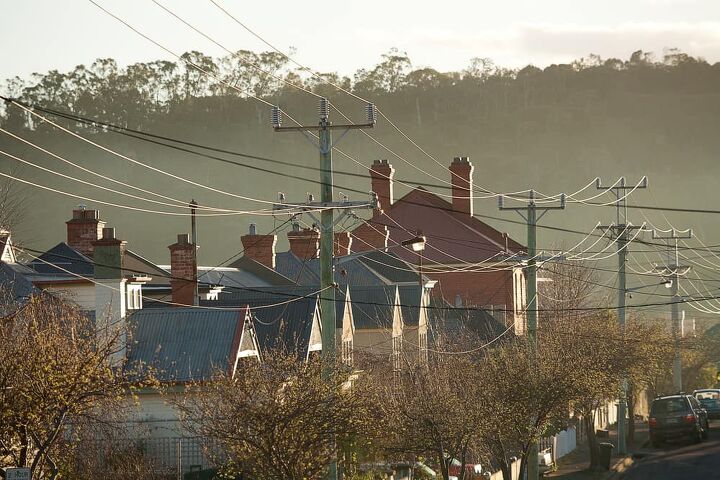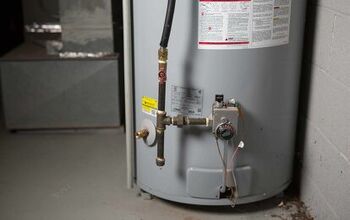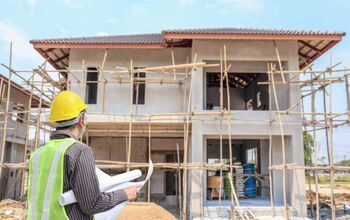What Are The Pros And Cons Of Living Near Power Lines?

With all of our devices, power lines are essential in our electricity-driven world. This is apparent every time there’s a power outage, and we can’t use our microwave, cell phones, and TVs. But you may not have considered what it’s like to live near, or even under, power lines.
Living near power lines can help you find your dream home under budget, often in a less-crowded neighborhood. Plus, it pretty much guarantees that you always have electricity first. However, it can also make selling your home difficult, require extra paperwork, and even pose a health risk.
Read on to find out the various pros and cons of living near or under power lines. Armed with the right information, you’ll truly have the power to make the right decision for you and your family.
Do You Need to Hire Movers?
Get free, zero-commitment quotes from pro contractors near you.

What Exactly Are Power Lines?
The local power company sets up power lines for power and electrical energy distribution across large distances. Large towers or poles feature between one to three uninsulated electrical cables running between towers. The cables can be underground but, in most cases, run overhead.
What Are the Pros of Living Near Power Lines?
Living near power lines isn’t a very popular option, so for this reason, you’ll find less crowded neighborhoods. You’ll also find more bang for your buck when it comes to property prices.
Finally, living near power lines can ensure that you have more power and power restored before others in an outage.
1. Living Near Power Lines Is Often Less Crowded
Because there’s somewhat of a stigma with living near power lines, which we’ll describe later– it’s not everyone’s first choice. Therefore, neighborhoods are typically less crowded, which often means more space between houses. Less densely packed neighborhoods mean less traffic, noise, and pollution.
2. Living Near Power Lines Can Be Cheaper
Also, living near power lines can be less expensive because it’s often slightly less desirable than a different neighborhood. This can mean that you’ll get the same or comparable home for less simply because it’s near power lines. Because of the cheaper cost and less crowded neighborhoods, you’re also likely to get a much larger property size.
Living near power lines can be an excellent way to get your dream home on a first home budget. It’s also a great idea for a starter home while you budget and save for something more expensive. Plus, oftentimes, property developers make the homes near power lines more spacious and beautiful to increase their marketability.
3. Living Near Power Lines Is Powerful
Pardon the pun, but living near power lines can be very powerful. For starters, since you’re closer, you will likely get a higher voltage as opposed to a home 40 houses down. This higher voltage has some perks. You’ll notice this in your appliances and in the way that your entire home can seem to run more efficiently.
Also, in the instance of a power outage, living near power lines can be one of the best places to be. It’s likely the power company will restore power to the main poles first. Living near power lines can be convenient, especially in areas that are prone to severe weather. Since you’re so close, this means that your grid will likely have power before many others you know.
4. No Reported Health Concerns
While there have been rumors over the years of various health issues associated with living near power lines, there is no scientific proof to back up these claims. Health organizations, including the WHO, have no discovered any concrete evidence that links EMF exposure to serious health concerns. In 2002, the World Health Organization carried out research to determine if there was a link between electric/ magnetic fields and human health.
Their findings showed no strong evidence that any mutation is directly caused by low-frequency magnetic fields. Plus, they found no evidence to support that electromagnetic fields cause cancer.
5. Living Near Power Lines is Safe
Governments typically have restriction laws in place regarding housing projects placed near power lines. According to the Bonneville Power Administration (BPA), underground pipes, fences, cables, and other sections of a home must be no less than 50 meters away from the closest tower. There are also laws that dictate other activities, like farming, shooting, and flying kites under the lines that help make it safer to live nearby.
Even though homes may be located near power lines, they are placed at a safe distance. With minimum space in between homes and power lines required by restriction laws, the risk of EMF exposure and electrocution is reduced.
6. Those Who Live Near Power Lines Enjoy Free Yard Maintenance
Yes, you read that right. When you let trees grow unpruned near power lines, there’s a high risk that they can fall during a storm. For this reason, proper yard maintenance is required to control growth. It can be both labor intensive and expensive, especially if you live in an area with tons of trees.
However, if you live near power lines, the power company will typically do all the tree maintenance for you as it can interfere with the grid. An affordable, beautiful, safe home with free yard maintenance? You can’t beat that deal!
The Cons of Living Near Power Lines
Power Lines have a lot of buzz about them, quite literally, and this can often lead to extra noise and paperwork. There are also claims that living near power lines could cause various medical problems, including cancer and hallucinations.
1. Living Near Power Lines Can Lower Your Property Value
Articles have claimed that living near power lines can lower property values by 30%, but there isn’t supporting evidence. A recent study on the West Coast found an almost 300K home sold for an average of $5,000 less. A $500,000 house sold for $12,500 less on average when near power lines, just 2.5% lower.
2. Living Near Power Lines Can Be Noisy
If you’ve ever heard how quiet it is when the power is out, you know there’s a “hum” to electricity. When the field strength on the high voltage line conductor is greater than the surrounding air, it emits a noise. This isn’t a loud noise, but it could be enough to bother you if you love stone-cold silence. The noise can also create fear in potential buyers, making your home more difficult to sell.
3. It Can Be Hard to Sell a Home Near Power Lines
Because of some of the aforementioned issues, it can be more challenging to sell a home near power lines. Generally speaking, there is a ton of negative perception surrounding purchasing a home near power lines. It can make people uncomfortable, thus, unwilling to buy such homes.
Surprisingly, though, it’s not difficult to rent a home near power lines as most tenants stay for a year on average. While you may be tempted not to disclose the lines, the real estate agents must mention this info.
This may also mean extra disclosure paperwork in your listing as well as within your selling agreement. Future homeowners may want to schedule inspections to ensure that the home is safe for proximity to power lines.
4. Some People Think Living Near Power Lines Causes Cancer
There’s long been a debate about living near power lines and whether this can cause certain types of cancer. EMF, or Electric Magnetic Fields (also known as radiation), are produced by power lines.
Although early studies in the 1970s linked leukemia and cancer in children to EMFs, later studies have produced mixed results. These EMFs are also found in electrical smart meters, cordless telephones, and even in WiFi networks. According to Cancer.gov, the currently published classification of EMFs is “possibly carcinogenic to humans.”
While there’s no link between cancer and power lines, if you’re anxious, you might want to think twice before moving. Just the thought that something is bad for you can cause depression and more symptoms to pop up.
5. It’s Thought that Living Near Power Lines Can Drive You Crazy
The World Health Organization posted a report in 2006 about EMFs and Electromagnetic Hypersensitivity to clear up these issues. Many people are susceptible to EMFs, and experience headache, fatigue, stress, sleep disturbances, and even skin prickling.
Some have taken these theories to extremes, citing how EMFs have taken over their brain waves. Others believe that certain EMFs, like 5G cellular service, are a method of foreign mind-control or manipulation. While these theories are widespread, there really isn’t evidence to prove them other than what WHO has stated is possible.
6. You Have to Be Extra Careful of Downed Power Lines
There’s always a chance of power lines falling or swaying in a storm, hurricane, or other wind disturbance. If you live beneath power lines, always be extra aware of lines that are low-hanging or touching the ground. Make sure to trim trees and branches that could come into contact with power lines and to take necessary precautions.
If you’re ever in doubt about whether you might hit a power line, always call the electric utility company first. And always assume that every line that’s down, even if it’s not making noise or sparking, is a live wire. Don’t ever touch a power line for any reason because it can result in death.
7. Living Near Power Lines Comes with Property Restrictions
While property restrictions increase the safety of your home near power lines, these restrictions limit what you can do with your property after you’ve purchased it. For instance, if you have plans to expand the home or install additional amenities, the restrictions may not allow you to do so. Since these projects can impact the power lines, especially if located too close, the law might not permit specific modifications.
Related Questions
How close is too close when living near power lines?
There are certain laws in each state and region regarding how close homes can be to power lines. If your home is a newer build, you’re probably already in the safe zone due to more stringent recent laws. You may want to double-check if you’re purchasing or leasing an older home.The current thinking is that a magnetic field can reach distances of 10 to 200 feet. A generally accepted safe distance away from power lines (due to their higher power) is 700 feet.
Who can I call for more information about power lines?
Your local power utility should be able to give you any requested information on power lines. This information should be on your monthly power bill. You can also look it up in a government or city directory. If you suspect that a power line is down, you should call the emergency utility number or 911.
Can living near power lines cause headaches?
The strength of magnetic fields is more potent than electricity naturally found inside a human body. When our bodies react to this change in current, it can produce things like nausea and headaches for most people. However, this isn’t well-documented, so you should keep a good track of your symptoms to determine the cause.
Do You Need to Hire Movers?
Get free, zero-commitment quotes from pro contractors near you.

What We’ve Learned
Basically, there is no sufficient evidence to prove that living near power lines can cause cancer or hallucinations. While some may be sensitive to EMFs, you should evaluate the situation based on what is best for each person. Living near power lines can be a way to get a dream home for less than a comparable property elsewhere.
Though you may end up having a lower value when you decide to sell, it’s not as much as advertised. Whether for a year or thirty, living near power lines can be the way to score a home for less. If you decide to live near power lines and go for it, you’ll find it can be electrifying.

Stacy Randall is a wife, mother, and freelance writer from NOLA that has always had a love for DIY projects, home organization, and making spaces beautiful. Together with her husband, she has been spending the last several years lovingly renovating her grandparent's former home, making it their own and learning a lot about life along the way.
More by Stacy Randall



























